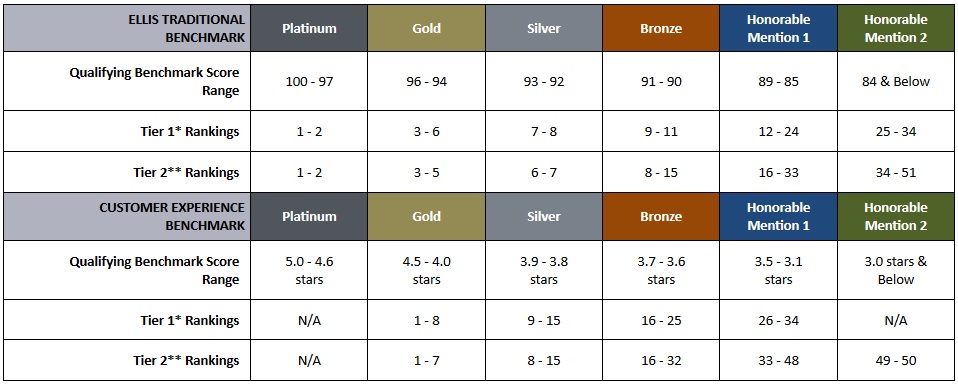Second Quarter 2018 Benchmark Results for Mystery Shops and Resident Surveys Executive Summary
Since 1984, Ellis, Partners in Management Solutions has specialized in helping the multifamily industry achieve their business goals. Today we offer a turnkey integrated customer experience program, backed by our outstanding customer service, sophisticated technology, and ethical business practices. Our mystery shops, resident surveys, and training are resources that can be used independently to address specific needs or together for ongoing employee performance optimization. We believe the more you know about your customers and what they have to say about your people, product, and services, the better you can respond to and anticipate their needs. As a result, the more successful you will be at developing loyal customers who invest more, stay longer, and refer friends and family. Our goal is to help you achieve yours.
As we dig into our 2018 theme: “Developing the Outstanding Employee into a Leader,” we will cover four teachable skills that can be developed in your future leaders: Wearing Multiple Hats, Decision Making and Problem Solving, Conflict Management Skills, and Dealing with Change. In this letter we will focus on the skill-set of Decision Making and Problem Solving.
We thank you for joining us each quarter as we convey combined Benchmark results and sales trends and offer practical improvement ideas.
Second Quarter 2018 Benchmark: Overall Results
Mystery Shops
Ellis benchmarks mystery shop performance on the 10 key Benchmark questions and the Customer Experience. Companies can qualify for platinum, gold, silver, or bronze level based on their company’s overall Benchmark score for the quarter.
In 2017, the overall average Ellis Traditional Multifamily Industry Benchmark score across Ellis’ entire database of eligible shops1 was 85%, representing 43,606 shops, compared to 86% for Second Quarter 2018 representing 11,438 shops. In 2017, the overall average Ellis Customer Experience Benchmark score was 3.6 and remains steady at 3.6 for Second Quarter 2018.

* Tier 1 = 70 or more shops
** Tier 2 = 30-69 shops
Resident Surveys
The Ellis Loyalty Benchmark identifies and recognizes the customer experience performance of companies subscribed to the Ellis Resident Surveys Program. It evaluates performance on 5 key touchpoints of the prospect and resident journey. The percentage of surveys responded to by the onsite team and the average number of days it took for the team to respond are also measured because these two factors impact the customer relationship and overall loyalty. Utilizing customer loyalty as a metric allows customer-centric companies the ability to forecast three specific customer behaviors: likelihood to convert/renew, willingness to pay more, and likelihood to recommend.
Ellis’ customer loyalty score is based on a scale of 0%-100% (see chart below):

The overall average Ellis Loyalty Benchmark score in 2017 was 74%, compared to 75% for Second Quarter 2018. In 2017, the onsite response rate averaged 87%; Second Quarter 2018 reflects a drop to 86%. Teams took an average of 5.6 days to respond in Second Quarter 2018 versus an average of 6.3 days in 2017.

CONGRATULATIONS TO ELLIS BENCHMARK’S TOP PERFORMING COMPANIES SECOND QUARTER 2018
Mystery Shops
Ellis Traditional Benchmark Platinum Level Achievers
Tier 1 (70 or more completed shops)
- Western National Property Management
- Windsor Property Management Co / GID
Tier 2 (30-69 completed shops)
- GHP Management
- Legacy Partners Residential, Inc.
Ellis Customer Experience Benchmark Gold Level Achievers
Tier 1 (70 or more completed shops)
- AMLI Residential
- Cortland Partners
- Gables Residential Services
- Irvine Company Apartment Communities
- Mid-America Apartment Communities
- Mill Creek Residential Trust
- Windsor Property Management Co / GID
- Wood Partners
Tier 2 (30 – 69 completed shops)
- Altman Management Company – FL, MI & TX
- GHP Management
- Legacy Partners Residential, Inc.
- Matrix Residential
- Richman Property Services, Inc.
- The Carlyle Group
- ZRS Management, LLC
Resident Surveys
Ellis Best in Class Achievers
Tier 1 (1600 or more surveys received)
- Affinity Property Management
- Block Multifamily Group, LLC
- CWS Apartment Homes, LLC
- Fore Property Company
- Guardian Management, LLC
- Lincoln Property Company
- LMC, a Lennar Company
- Manco Abbott
- Simpson Property Group
- The Tomanek Group
- Zaremba Management Company
Tier 2 (1599 or fewer surveys received)
- Carlisle Property Management (CPM)
- HRI Properties
- Longboat Enterprises
- PVGV Management
- ResideBPG
- Reybold Venture Group
- Sunrise Management & Consulting
- TM Realty Services
*Companies are listed in alphabetical order
**Customer Experience Benchmark gold level achievers are recognized as there were no platinum achievers for this period
ELLIS’ SECOND QUARTER 2018 BENCHMARK: QUESTION/TOUCHPOINT RESULTS
Mystery Shops
How did we do?
The chart below reflects the average Second Quarter 2018 score of Ellis’ entire database of eligible shops1 for each of the 10 key benchmark questions, the Customer Experience by category, and the combined overall Benchmark scores.


Resident Surveys
The chart below reflects the average scores across all Ellis Resident Survey companies for each survey touchpoint for Second Quarter 2018, and the combined overall loyalty score and average accountability performance results.

Developing the Outstanding Employee into a Leader – Part II: Decision Making and Problem Solving
Wilfred A. Peterson, 20th century author known for his inspirational wisdom, once said, “Decision is the spark that ignites action. Until a decision is made, nothing happens…. Decision is the courageous facing of issues, knowing that if they are not faced, problems will remain forever unanswered.” If you have spent any time working in property management, you know the majority of your day is spent chasing what might feel like impossible decisions. Whether you are dealing with personnel issues, current residents, future residents, maintenance problems, pets, technology, or something else, you are constantly facing obstacles that lurk around every corner. Just as problems do not occur in a vacuum, neither do solutions appear from thin air. It is a mistake for leaders to assume they must solve every problem by themselves. Problem solving, like leadership in general, requires involvement of others. The leader who can exert command over a problem, involve the right people to solve it, and support them in their efforts, is the individual companies need most desperately. Outstanding employees who are encouraged to participate and develop their own decision making and problem solving skills have the potential to help your company grow and prosper. While many discussions can branch out from this particular topic, here are three important points to consider when your goal is to identify and nurture decision making and problem solving skills in your future leaders.
1. Not Every Outstanding Employee Is a Future Leader
Wait, what? While an employee may show signs of initiative, this does not mean they should be identified as the next property manager, regional manager, or vice president of your company. “The “everyone is a leader” myth, which has been blindly accepted as truth, actually waters down the significance and uniqueness of the gift of leadership and keeps people who don’t have that gift from finding out what they actually are great at doing. It’s like telling an athletic team that all of its members are star players, when that is far from the reality. If all of the team members believed they are stars and their coaches manage them as if they are, there would be no teamwork, chaos would reign, and success would fly out the window.” -Betsy Jordyn, The Consultant’s Consultant
If you look back in history, it is in the most difficult moments that leaders are tested and learn of what they are truly made. All great leaders I have known over the years have been willing to take risks and learn from their mistakes. Studies have shown that when most people experience failure, it threatens their sense of self-confidence, but true leaders have the ability to respond to difficult decisions and even failures with resilience. Our industry presents the perfect atmosphere for your future leaders, ripe with unexpected experiences, lessons, and failures, and with hurdles potentially lurking around every corner. Your future leaders will rise up, but keep in mind they are not always the most tenured or popular, nor the ones who make the most noise. The best leaders all have a similar natural set of traits that inspire and motivate a team to be the best they possibly can be: calmness, confidence, communication, integrity, compassion, patience, insightfulness, open-mindedness, and courage.
A leader who has the ability to systematically think through the facts of the problem in front of them, diagnose the situation, and find a workable solution will help your community prosper. The decision making and problem solving process is a neverending cycle of planning, doing, checking, acting, and monitoring outcomes. It can be exhausting! Again, not everyone is cut out for the job. In the book The Sales Leader’s Problem Solver, the author discusses how the act of solving a dilemma enhances the person’s leadership credentials. It can be difficult to really know the true potential and character of a person until you see the way they solve problems. Current leaders and talent development team members should always have their “potential leader radar” turned on and be ready to involve and delegate to the up-and-coming leader.
2. You Cannot Do It All – Delegate Authority
To be a successful leader, you must learn how to delegate well. Too often, leaders and managers simply ask someone to complete a task that is so easy it needs little to no explanation. They pass on busy work, or they delegate an important task with little guidance. Most of the fears leaders have about delegating authority have to do with losing control. What if they fail at the task? What if they do a better job than me? This leads many leaders to just do it themselves. When a leader learns to delegate authority well, they are modeling this important skill-set for their future leaders. “The best executive is the one who has sense enough to pick good men to do what he wants done, and self-restraint to keep from meddling while they do it.” – Theodore Roosevelt, 26th U.S. President
A willingness to delegate authority to a capable employee demonstrates trust and trust builds loyalty. In order to develop employee potential, leaders should also clearly convey the level of authority they are delegating to an employee. As the level of trust builds in the relationship, the willingness to delegate a higher level of authority should as well.
- Level 1 – No Trust. I know what I want you to do. Do it exactly like I want it done.
- Level 2 – Little Trust. We can discuss it, but I am going to tell you how I want it done.
- Level 3 – Respectable Trust. I am open to recommendations, and I would like you to tell me what you think we should do. If I agree, you can proceed.
- Level 4 – High Trust. Do whatever you think is best, and then tell me what you did. I trust you, but I would like you to keep me in the loop.
- Level 5 – Highest Level of Trust. Do whatever you think is best. You have my full support.
Are the names and faces of your prior bosses running through your head? As the old saying goes, “Rome wasn’t built in a day,” and neither was trust. While the highest level of trust is built over a period of time, you have to start somewhere. Sadly, many leaders never make it past Level 2. So, the next time you have an opportunity to delegate responsibility to your future leaders, consider these simple steps and lead by example.
- Clearly convey what is required of them and the goal that is to be achieved. This should be a detailed discussion.
- Give them the tools and authority to complete the task.
- Agree to a deadline. Open the door for questions and check in on them periodically.
- Once the task is complete, discuss what went right and what could have been done differently. The feedback should always be encouraging while giving the employee room to reflect on the experience. This is a fantastic opportunity for self-evaluation.
Every time you delegate authority, you are investing in the future leaders of your company. As you progress through the various trust levels with your employees, you will eventually put yourself in a position where you too can take on more responsibility and grow. Leaders should always be thinking, “Who will be my replacement when opportunity knocks on my door?” rather than “Who is trying to steal my job?”
3. Not All Decisions and Problems Are Created Equal
In property management, we are always putting out fires though not all are the same size or type. Some problems cannot be solved no matter what you do, while others can be handled quickly, and still others need to be extinguished like a wildfire – quickly and with extra back up. The ability to know what resources are needed for solving each problem and the steps to take can be challenging for a leader in training. No matter what the situation, a leader must ask two questions when faced with a problem: What happens if I do nothing? What happens if I do everything possible? Sometimes the outcome is the same.
Teaching employees early on to step back and assess the situation gives them the benefit of perspective and time. Assessment is a form of reflection; it helps a leader to think. Leaders exist to solve problems and make decisions, and they should be prepared to tackle each one with fresh eyes. If we reach back into our sales treasure chest, we will find that a familiar sales and relationship selling process is also a great approach to practice problem solving.
- Establish a connection. Present a problem to the employee. Create open dialogue and discuss thoughts and ideas.
- Identify needs. Ask what they would want to be done if it were their problem. Determine the magnitude of the problem and the urgency to solve.
- Present solutions. Look outside the problem to gain perspective. Have they had a similar experience in the past? How is it the same or different? Consider and present multiple solutions. Encourage dialogue.
- Close. Delegate the appropriate level of authority. Give ownership of the problem to the employee so they can implement the solution. Trust them to do the job. Let go…but not completely. Hold on to the reins loosely and stay “in the loop” – informed of progress and available for consultation.
- Follow-up. Encourage the employee to evaluate the steps they took to solve the problem. Ask what they would do the same or different next time.
While some decisions will come easy and others will not, problems need to be exposed and tackled by those most capable. Failure is inevitable, but it serves as the greatest lesson in life and in business. Winston Churchill once said, “Success is stumbling from failure to failure with no loss of enthusiasm.” Encourage your future leaders to embrace problem solving and the many unseen treasures it offers.
We thank you for your ongoing participation and feedback, which help make this report informative, fresh, and a reliable resource. We hope you will find Ellis Partners in Management Solutions to be not only the finest source for mystery shopping and resident surveys but also a training resource (including our partner Edge2Learn) for your organization. Additional support and information can be found on our website.
July 31, 2018
Prepared by Joanna Ellis, Chief Executive Officer and Francis Chow, Chief Strategic Officer
Footnotes: 1 See Ellis website for Benchmark eligibility, tier level, and recognition requirements for mystery shops and resident surveys.

